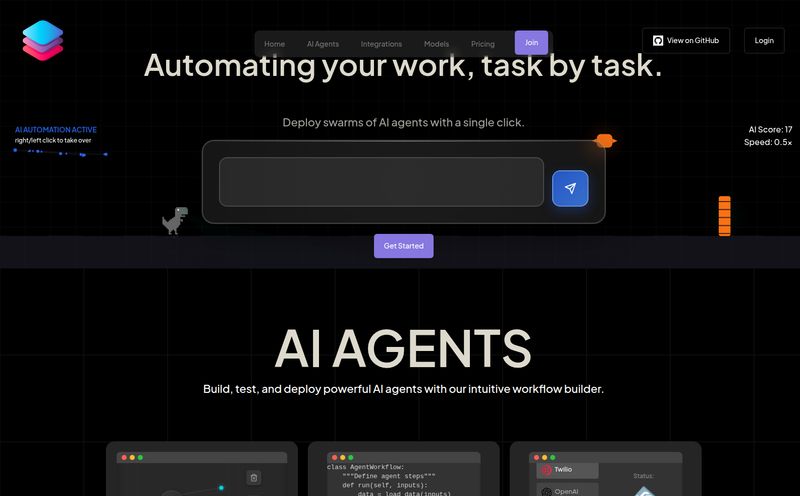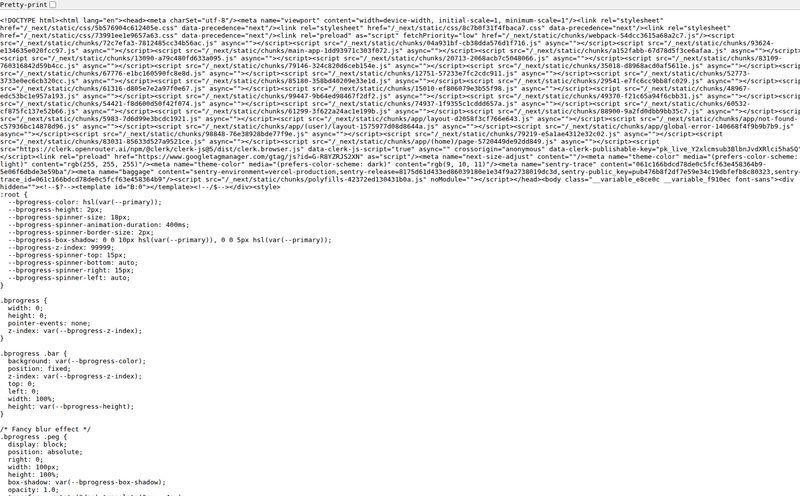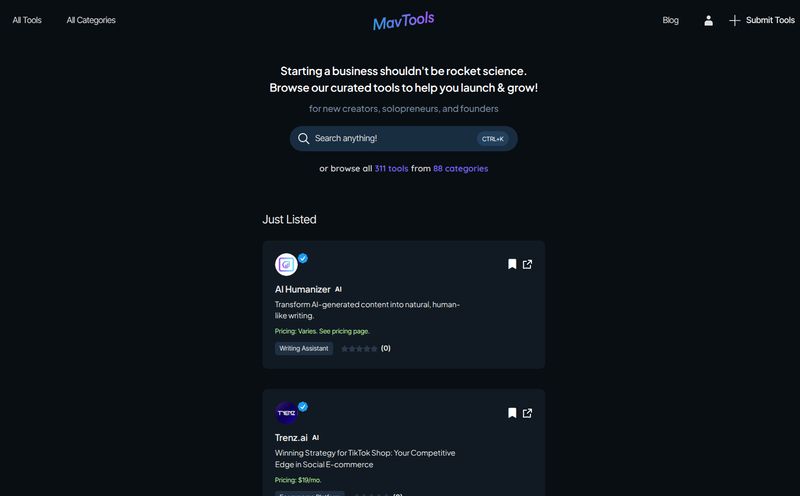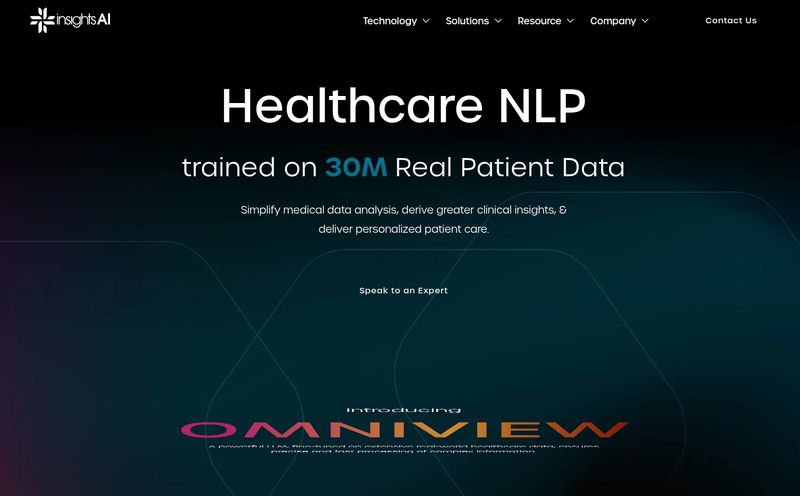We've all been there. It’s 11 PM, you're three cups of coffee deep, and you're staring at a spreadsheet that desperately needs data from a dozen different competitor websites. You tried a simple scraper script, but it broke after ten requests. Your IP is probably on a watchlist somewhere in Lithuania. You start Googling for pre-built solutions, and suddenly you're falling down a rabbit hole of sketchy-looking tools and forums from 2011.
It’s the drudgery of modern SEO and marketing work. We need data. Constantly. Fresh pricing data, social media follower counts, SERP positions, contact info, you name it. But getting that data can feel like trying to catch smoke with a net. For years, I've cobbled together solutions—a bit of Python here, a shady proxy service there, a whole lot of frustration everywhere. So when I stumbled upon GetOData, I was naturally skeptical. Another platform promising to solve all my data extraction woes? Sure. But I decided to give it a look, and honestly, I'm kind of kicking myself for not finding it sooner.
So What Exactly is GetOData?
In the simplest terms, GetOData is a massive API marketplace. Think of it less like a single tool and more like a gigantic, well-organized library. But instead of books, the shelves are stocked with over 4,000 different APIs—pre-built little programs designed to fetch specific data from the web. Need to scrape Amazon product details? There's an API for that. Want to pull bulk Moz metrics for a list of domains? Yep, there’s one for that too. It’s a centralized hub to discover, compare, and actually use these tools without having to build them from the ground up.
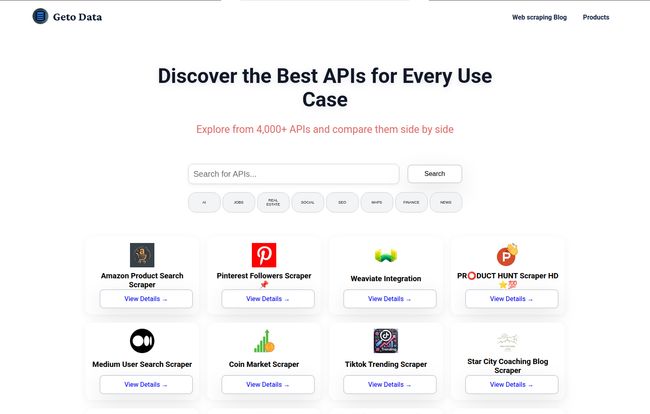
Visit GetOData
This isn't just a list of links, either. It’s an integrated platform where you can run these scrapers, often with no-code interfaces, and manage everything in one place. It’s designed to be the bridge between a simple, one-off data pull and a full-scale, custom-coded data pipeline.
My First Impressions and The Core Experience
Logging in, the first thing I noticed was the clean interface. It's not cluttered with a million menus or pop-ups. It’s just a big search bar that says, “What do you need?” and a grid of popular APIs. You can filter by categories like SEO, Social, Finance, or AI. It feels direct and purposeful.
I will admit, seeing “4,000+ APIs” can be a little overwhelming at first. It’s like walking into the world's biggest hardware store when you just need a single screw. But once you start searching for what you need—say, “Twitter scraper” or “Google Maps extractor”—the value becomes immediately clear. You’re not just getting one option; you’re getting several to compare. It turns the process from “building a solution” into “choosing the best one.” A much better proposition if you ask me.
The Features That Actually Matter to an SEO Pro
Okay, let's cut to the chase. A big library is nice, but what are the actual features that make this thing worth paying for? As someone who lives in spreadsheets and analytics dashboards, a few things really stood out.
A Massive Library of Pre-Built Scrapers
This is the main event. The ability to instantly access a scraper for just about anything is a game-changer. I'm talking about tools like the Moz Bulk Metrics scraper. Instead of manually checking Domain Authority for 100 potential backlink partners, I can just feed it a list and get the data back in a clean format. Or the Amazon Product Search Scraper for doing deep competitor analysis on pricing, reviews, and stock levels. For social media managers, things like the Pinterest Followers Scraper or the TikTok Trending Scraper can automate a huge chunk of competitive research.
The No-Code Chrome Extension
Sometimes you don't need a huge, scheduled data pull. You just need to grab the data from the page you’re looking at right now. GetOData has a Chrome extension for that. It’s a fantastic tool for those quick, on-the-fly jobs. You can extract data from a website’s structure without having to write a line of code or even go back to the main dashboard. It’s a small thing, but it saves so much time over the course of a week.
Digging Deeper with Apify Actors
This is where things get a bit more advanced, but in a good way. GetOData is built on Apify, a powerful web scraping and automation platform. The 'Actors' are basically cloud programs that can perform more complex tasks. So while the Chrome extension is great for a quick grab, an Actor can be set up to, say, scrape a list of job postings from a specific site every single day and email you the results. It’s the perfect middle ground for when you need more power but don’t want to manage your own servers and infrastructure. They handle all the nasty stuff like Javascript rendering and IP rotation behind the scenes.
Let's Talk About the Price Tag
Alright, the all-important question: what's this going to cost? The pricing is refreshingly straightforward, broken down into three main tiers. I've always appreciated transparency here, and they lay it out pretty clearly.
| Plan | Price | Best For |
|---|---|---|
| Freelancer | $29 / Month | Solo SEOs, marketers, or developers who need regular but not massive data pulls. |
| Startup | $90 / Month | Small agencies or startups with more demanding data needs. The jump in concurrent requests is significant. |
| Business | $170 / Month | Established businesses or agencies where data extraction is a core, daily function. |
In my opinion, the Startup plan is the sweet spot for most small to medium-sized teams. The Freelancer plan is a fantastic starting point, but you'll quickly appreciate the extra power and priority support of the Startup plan once data becomes a bigger part of your workflow. The fact that all plans include features like Super Antibot Bypass and Rotating Proxies is a huge plus – those are the features that save you the real headaches.
The Good and The Not-So-Good
No tool is perfect, right? Here’s my honest breakdown after spending some time with the platform.
What I Really Appreciate
The biggest win here is the sheer efficiency. The amount of time and technical frustration saved by not having to build and maintain my own scrapers is worth the subscription fee alone. The built-in proxy and antibot handling is a godsend. I've spent way too much of my life dealing with IP blocks and CAPTCHAs, and having a tool that just handles it is a massive relief. The combination of easy-to-use tools and more powerful options means it can grow with your needs.
A Few Things to Keep in Mind
As I mentioned, the catalogue of 4,000+ APIs can feel like a lot to take in. It takes a moment to find your bearings and pinpoint the exact tool you need. Also, let's be clear: while there are free tools and trials, the real power of GetOData is in its paid subscription plans. This isn't a completely free-for-all tool, but you get what you pay for, which in this case is reliability and power.
Is GetOData Right for You?
So, who should be running to sign up for this? I'd say if you're an SEO agency, a marketing team, a data analyst, or even a freelancer who regularly needs data from the web, this is a no-brainer to check out. If you’ve ever said the words, “I just wish I could get all this data into a spreadsheet,” then GetOData is probably for you.
The alternative is to continue doing it the hard way: building your own scripts, paying for separate proxy services, and dealing with constant maintenance as websites change their structure. When you factor in the time cost of that approach, a subscription here starts to look like a bargain.
Frequently Asked Questions About GetOData
- Is it legal to scrape public data?
- Generally, yes, scraping publicly available data for internal analysis is fine. However, you should always respect a website's Terms of Service and `robots.txt` file. GetOData positions its tools for personal and internal use, not for large-scale redistribution that might violate those terms. When in doubt, consult a legal expert.
- Do I need to be a developer to use this?
- Absolutely not! That's one of its biggest selling points. For many of the scrapers and the Chrome extension, you just enter a search term or a URL and click a button. No coding required. If you ARE a developer, you'll appreciate the power of the underlying Apify platform.
- What kind of data can you extract?
- Pretty much anything that's visible on a public webpage. Think product prices, descriptions, and reviews from ecommerce sites; job titles, companies, and locations from job boards; social media follower counts and post interactions; or SEO metrics from various tools.
- How do you even get started?
- It's super simple. You find an API you want to try, hit the 'Try Now' or similar button, and it guides you through it. Usually, it's just a matter of inputting a search term or a web address. There's no complicated setup needed to get your first results.
- Does it handle things like getting blocked by websites?
- Yes, and this is a huge deal. The platform includes smart features like a “Super Antibot Bypass” and automatically rotates IP addresses (Rotating Proxies) to dramatically reduce the chance of your scraper getting blocked. It handles the cat-and-mouse game so you don’t have to.
My Final Word on GetOData
Look, the internet is built on data, and those who can access and interpret it the fastest have a serious advantage. For a long time, that advantage was reserved for those with deep technical skills or deep pockets for custom development. GetOData feels like it’s democratizing that access. It takes the most painful parts of web scraping—the coding, the maintenance, the proxies, the blocks—and abstracts them away, leaving you free to just focus on getting the data you need.
It’s not magic, but it’s pretty darn close. In a world where data is king, GetOData doesn't just give you a seat at the table; it hands you the keys to the entire kingdom. And for a busy SEO professional, that’s an incredibly powerful thing.
